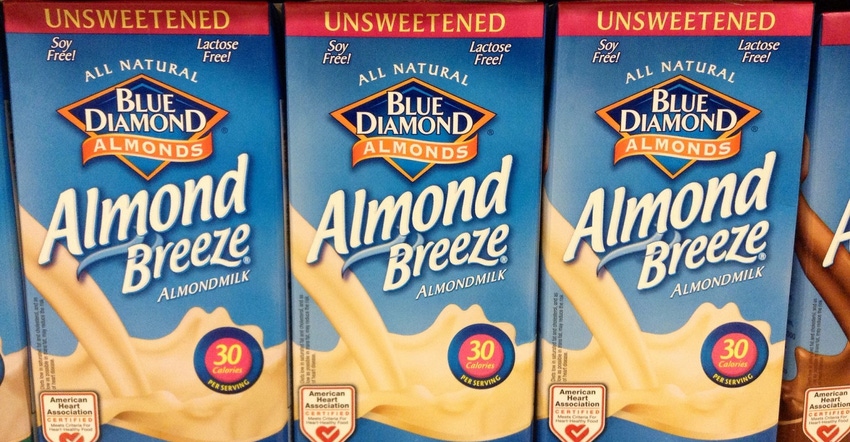NMPF files citizen petition on dairy labeling
Industry groups note mislabeling of nut- and plant-based beverages as “milk” confuses consumers from a nutritional equivalency standpoint.
February 25, 2019

The National Milk Producers Federation (NMPF) filed a citizen petition Feb. 21 with the U.S. Food & Drug Administration outlining a labeling solution to the use of dairy terms on non-dairy products as the agency considers public input from a recently concluded comment period.
The petition reinforces current FDA labeling regulations, with some additional clarification, to show how marketplace transparency can be enhanced and consumer harm from confusion over nutritional content can be reduced. It also addresses several arguments raised by marketers of vegan foods as part of the ongoing debate on dairy labeling, such as the false idea that creating consistent, clear labeling of non-dairy products would somehow limit the use of dairy terms on products that clearly aren’t marketed as dairy substitutes, such as peanut butter.
“The FDA comment docket gave us the chance to explain why there is a compelling need to resolve this labeling issue to address consumer confusion over nutritional content,” NMPF executive vice president Tom Balmer said. “This petition lays out a constructive solution to the false and misleading labeling practices existing in the marketplace today and provides clear, truthful and understandable labeling options for marketers of plant-based imitation dairy products.”
In its petition, NMPF urges FDA Commissioner Scott Gottlieb to: “Take prompt enforcement action against misbranded non-dairy foods that substitute for and resemble reference standardized dairy food(s), (e.g., milk, yogurt, cheese, ice cream, butter), yet are nutritionally inferior to such reference standardized dairy foods.” Under existing FDA rules, such foods are required to use the word “imitation” if they reference a standardized dairy food but do not have the same nutritional value. The petition also points to long-standing rules that provide for using the words “substitute” or “alternative” in conjunction with a dairy term when such products are deemed nutritionally equivalent to the dairy products they reference.
“Marketers of plant-based foods that are designed to resemble standardized dairy foods actually have several labeling options under current FDA regulations, as we point out in this petition,” Balmer said. “The unfortunate reality today is that many of them are playing fast and loose with the labeling rules to mask their nutritional inferiority to real dairy products.”
The NMPF petition notes that any manufacturer not wishing to use modifiers such as “imitation,” “substitute” or “alternative” may simply eschew the use of dairy terms altogether – an approach that’s already common in the rest of the world and practiced by some companies in the U.S., including Chobani, Trader Joe’s and Quaker.
NMPF also addresses First Amendment arguments that have been raised by opponents via a thorough discussion of relevant case law on commercial speech rights. Beginning with the landmark Central Hudson Gas & Electric Corp. vs. Public Service Commission and running through more recent decisions such as Zauderer and American Meat Institute vs. USDA, the petition explains how NMPF’s proposed solutions focus on disclosure requirements narrowly tailored to improving labeling transparency and promoting informed consumer choice – and are emphatically not a “ban” on the use of dairy terms by plant-based products.
“Our approach does not advocate for any so-called ‘bans,’” Balmer said. “It simply relies on proper disclosures that allow for appropriate, truthful, non-misleading messaging. In the end, products that are ‘milk-like’ or ‘yogurt-like’ are not actual milk or yogurt, and the nutritional distinctions are critical to informed consumer decision-making. That’s what our petition is all about.”
Earlier this month, the American Farm Bureau Federation (AFBF) told regulators in formal comments to FDA that the mislabeling of nut- and plant-based beverages as “milk” confuses consumers from a nutritional equivalency standpoint. FDA expects to issue a rule on the use of the names of dairy foods in the labeling of plant-based products later this year.
AFBF told regulators that consumers know the nutritional value of products labeled “milk” and likely infer that any product bearing this term possesses the same, or at least an equivalent, nutritional profile. However, this is not the case. For example, one serving of traditional milk contains 8 g of protein, while many plant- and nut-based beverages have a lower protein content.
A recent survey conducted by IPSOS and commissioned by Dairy Management Inc. found that 53% of respondents stated that they believe plant-based food manufacturers label their products “milk” because their nutritional value is similar – although it is not.
While AFBF stated that it “wholeheartedly supports a consumer’s right to access dairy-free products from an allergy, intolerance or personal dietary preference perspective,” consumers often “rely on product indicators, such as the name on a product’s labeling, rather than technical information on the back of a label.”
AFBF explained, “This can create confusion when consumers are in the grocery store deciding to purchase milk or a non-dairy substitute. Nut- and plant-based beverages are marketed as milk and sold in the milk case right alongside traditional milk.”
AFBF reminded officials that FDA already has rules and a clear process for handling this issue: If the modified food is nutritionally inferior, as is most often the case in plant- and nut-based beverages, it must bear the word “imitation.” Even if the food is not nutritionally inferior, it must bear either the words “substitute,” “alternative” or another appropriate term, AFBF said.
You May Also Like



